Since 1948, Israel has set itself a task of finding creative solutions to some of the world’s most pressing problems. To celebrate Israel’s 65th birthday, ISRAEL21c looks at some of the best achievements.
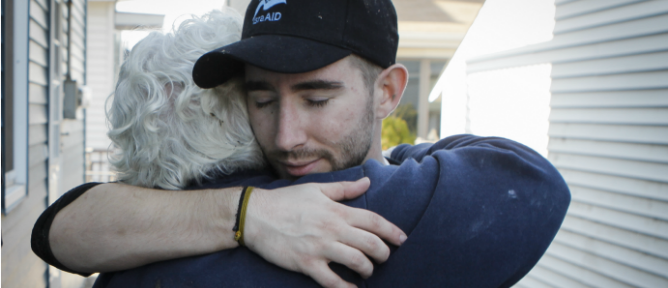
A member of IsraAid helping out local residents in the wake of Hurricane Sandy. Photo courtesy of IsraAID.
When 22-year-old Emmannuel Buso was pulled barely-alive from the rubble of a three-story building 10 days after an earthquake devastated the island of Haiti, the first faces he saw were those of the Israeli rescue workers who had flown across the world to save lives.
For Haji Edum, from Zanzibar, his life-saving moment came twice, when he was flown at age 15, and then again at 23, to Israel for open-heart surgery. He is just one of thousands of youngsters to receive emergency heart care from volunteer doctors in Israel.
War veterans suffering post-traumatic stress in the US; farmers in Senegal, India and China; young women in South Sudan; the wheelchair-bound in Africa; cardiac patients in Gaza and Iraq – all have received life-changing help and expertise from Israeli specialists.
Today we all know the story of Israel the startup nation. News of its technological prowess and incredible innovation has spread far and wide. But what many people don’t know is that Israel is exporting far more than just technology. It is also sharing its experience and skills in a whole range of humanitarian and environmental fields to help people everywhere live better, fuller and healthier lives.
Since Israel was founded in 1948, the country has set itself the goal of becoming a light unto the nations. In the early years of the state, despite austerity rationing, the Israeli government founded MASHAV, the Israeli Ministry of Foreign Affairs’ Center for International Cooperation, as a vehicle to share Israel’s creative solutions with the rest of the developing world.
Israel remains true to that vision and every year, with little fanfare, and sometimes very little press attention, Israelis work long hours to find solutions and offer relief to some of the most pressing problems of our times.
From environmental breakthroughs that will help reduce greenhouse emissions, to technologies that can increase food production and save vital crops, to humanitarian aid missions in the wake of catastrophic natural disasters, Israelis are providing significant assistance.
To celebrate Israel’s 65th birthday, ISRAEL21c takes a look at some of the many creative and varied ways Israel is helping to enrich and improve our planet.
The list comes in no particular order, and is by no means exhaustive. There are hundreds, if not thousands, more worthy projects going on every day. If you’ve got a project worth hearing about, we’d be delighted if you include it in our comments section at the end.
1. An Israeli company is developing a toilet that needs no water, and generates its own power to turn solid waste (including toilet roll) into sterile and odorless fertilizer in 30 seconds. Liquid waste is sterilized and then used to flush the toilet. Developer Paulee CleanTec has been awarded a grant by the Bill & Melinda Gates Foundation, which reports that about 80 percent of human waste goes into rivers and streams untreated, and 1.1 billion people don’t use a toilet.
2. Fifty years ago, Lake Victoria carp was a significant part of the diet of Ugandan villagers. But when Nile perch was introduced to the lake, it decimated the carp population. Villagers had neither the equipment nor the expertise to catch the huge perch, and symptoms of protein deficiency started becoming apparent in their children.
Prof. Berta Sivan of the Hebrew University of Jerusalem came to the rescue with a multiyear project to help these African families. Using expertise developed in Israel, her project not only successfully spawned carp on Ugandan fish farms, but also provided training on how to dig and fill ponds and raise the small fish. Now local children have an abundant supply of protein.
3. About 50 percent of every grain and pulse harvest in the developing world is lost to pests and mold, but an Israeli scientist has developed a surprisingly simple and cheap way for African and Asian farmers to keep their grain market-fresh. International food technology consultant Prof. Shlomo Navarro invented huge bags, now marketed by US company GrainPro, which keep both water and air out. The bags are in use all over the developing world, including Africa and the Far East, and even in countries that don’t have diplomatic ties with Israel.
4. In January 2010, Israel won international praise for the speed and expertise with which it responded to a devastating 7.0-magnitude earthquake in Haiti that killed 300,000 people, injured hundreds of thousands and laid waste to the poverty-stricken country.
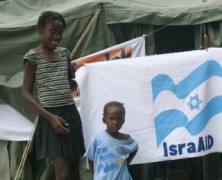
A team of 240 Israeli doctors, nurses, rescue and relief workers arrived in Haiti just days after the quake, bringing medicines, communications and medical equipment. Israel Defense Forces (IDF) volunteers set up the country’s most advanced and well-equipped field hospital in the capital of Port-Au-Prince. Israeli search-and-rescue missions pulled survivors from the rubble, saving many Haitians, including a man trapped for 10 days.
The delegation included volunteers from IsraAID, the IDF, ZAKA, Magen David Adom (MADA), Tevel B’Tzedek, the Negev Institute, and Alyn Hospital. It was the largest Israeli civilian relief mission ever assembled, and was one of the biggest and most skilled on the island.
In the wake of the disaster, Israel continues to send aid and assistance, including educational projects, trauma programs, micro-financing, development and relief work, rebuilding of communities and schools, aid packages, empowerment for women, and medical assistance.
5. The invention of drip irrigation by Israeli Simcha Blass and its development by Netafim, and later Plastro and NaanDan Jain, has completely revolutionized agriculture across the world, enabling farmers to increase their yields with less water. Constantly upgraded Israeli drip-irrigation techniques are regularly shared with other countries through MASHAV, Israel’s Center for International Cooperation.
6. Tal-Ya Water Technologies has developed reusable plastic trays to collect dew from the air, reducing the water needed by crops or trees by up to 50 percent. The square serrated trays, made from non-PET recycled and recyclable plastic with UV filters and a limestone additive, surround each plant or tree. With overnight temperature change, dew forms on both surfaces of the Tal-Ya tray, which funnels the dew and condensation straight to the roots. If it rains, the trays – which are now on sale – heighten the effect of each millimeter of water 27 times over.
7. About 1.6 million children under the age of five die from untreated drinking water in developing nations every year. An Israeli company has developed a water purification system that delivers safe drinking water from almost any source, including contaminated water, seawater and even urine.
WaterSheer’s Sulis personal water purifier is a small 10-gram mouthpiece that attaches to the top of a water bottle. The company has also developed systems to treat large quantities of water.
Sulis has been used in Taiwan, Myanmar and Haiti, and will be part of contingency plans in case of disaster at the 2016 Olympic Games in Brazil.
8. Israel is building a model agricultural village in South Sudan to teach local farmers about Israeli agricultural methods and technologies to help the fledgling African nation thrive.
9. In plants in China, Italy and the United States, Israeli company Seambiotic is using algae to turn carbon dioxide emitted by power plants into fuel and nutraceuticals. The company’s algae ponds, which are nourished by power plant effluent and sunlight, generate 30 times more feedstock for biofuel than do crop alternatives. The algae are a good source of valuable nutraceuticals, especially popular in China and the East.
Seambiotic is also working with the US National Aviation and Space Administration (NASA) to develop a commercially feasible biofuel variety from algae that has a higher freezing point than biofuels from corn or sugarcane.
10. The lives of thousands of endangered animals in West and Central Africa are being saved thanks to the tireless efforts of Israeli law enforcement activist Ofir Drori, who founded the Last Great Ape Organization (LAGA) in Cameroon, the first wildlife law-enforcement NGO in Africa.

The organization helped propagate a zero-tolerance approach to illegal wildlife trafficking in Cameroon, which has resulted in hundreds of arrests and prosecutions. The model has been replicated throughout West and Central Africa in activities that go beyond nature conservation to the defense of human rights.
11. Israel is the only country that permanently opens its arms to children sick from radiation caused by the Ukrainian nuclear disaster in Chernobyl over 27 years ago. More than 2,755 affected children, ages eight to 15, have been brought to Israel for treatment and resettlement.
12. Israeli researchers and farmers have combined the best of Israel’s agri-tech and clean-tech innovation to create a new artificial desert oasis that could help feed millions of desert-dwellers.
The oasis was developed by researchers from Ben-Gurion University and the Central and Northern Arava Research and Development center, and uses Israel’s expertise in growing salt-resistant crops in the Negev desert with little rain under a harsh sun. The oasis uses low-cost desalination technology that runs on solar power to turn brackish water into sweet water.
13. An Israeli company is developing a new contraceptive with the potential to provide a safer, long-acting, non-invasive solution for women in developing nations. Hervana recently won a $1 million grant from the Bill & Melinda Gates Foundation for its accessible, cheap and socially acceptable LJ-102 suppository, which has to be applied only once or twice a month via a non-hormonal vaginal preparation.
According to the World Health Organization, there are at least 220 million women who don’t have access to effective contraception, and some 50 million abortions per year in the developing world.
14. In the wake of Superstorm Sandy, the White House and the Federal Emergency Management Agency (FEMA) called on Israeli company Waze to use its real-time traffic navigation updates in an effort to bring fuel to New Jersey residents suffering from shortages at the gas pump.
15. An Israeli company has developed an alternative seed treatment that could revolutionize farming, protecting vegetable seeds from infestation, fungus, bacteria and even drought, without the side effects of genetic engineering (GMO).
Morflora’s product, TraitUP, “inoculates” any seed from foreseeable challenges without altering its genetic makeup in new generations — just like a mumps or measles shot in humans. The product has won international awards and goes on the market this year.
16. Doctors from Israel are restoring the gift of sight to hundreds of people in developing countries thanks to Israeli non-profit Eye from Zion.
The organization sends eye doctors from Israel to do free cataract removal operations in places such as Vietnam, China, Myanmar, the Maldives and even Muslim countries including Azerbaijan. The doctors are all volunteers, and most of the people arriving at their mobile clinics are blind in either one or both eyes. The organization also brings doctors from developing countries to Israel for training.
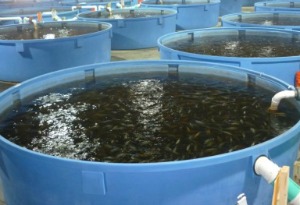
17. Overfishing and pollution are seriously depleting the number of fish in the sea and threatening some fish species with extinction, but now an Israeli company, Grow Fish Anywhere (GFA) has found a way to raise saltwater fish anywhere, even in the desert, without any of the usual problems of pollution. The company has facilities in Israel and New York.
18. An international charity is building a $6 million factory in Africa to build cardboard wheelchairs designed and developed in Israel. The wheelchairs are the brainchild of Israeli entrepreneur Nimrod Elmish of I.G. Cardboard Technologies, and are made entirely of cheap, recycled materials. The charity, which is dedicated to providing free wheelchairs for the disabled in developing nations, spends more than $6 million annually on buying metal wheelchairs from China and sending them to Africa.
19. With its plentiful year-round sunshine, it’s no surprise that Israeli companies are leading the way in creating viable and successful new solar energies that are already helping reduce the world’s dependence on pollution-causing oil.
Israel has become a startup nation for the sun with dozens, if not hundreds, of companies operating in this field, many of them driven by the early solar pioneers Zvi Tabor and Levi Yissar, and then later ones David Faiman, Jacob Karni and Avi Kribus.
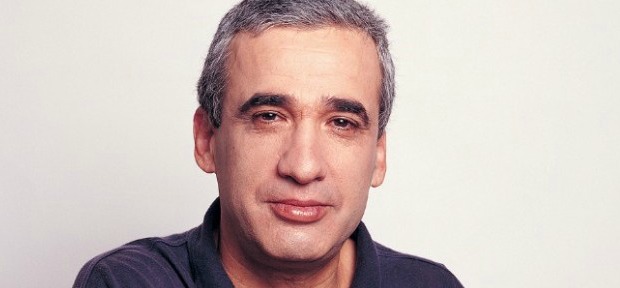
Aside from BrightSource, mentioned in an item below, solar companies to watch include Aora, HelioFocus and Arava Power.
20. Israeli educational entrepreneur Shai Reshef founded University of the People, the world’s first tuition-free, online academic institution offering a recognized bachelor’s degree. More than 3,000 professors from major universities volunteer as lecturers and tutors for students from many countries, including China, Pakistan, Haiti, Rwanda, Mali, Peru, Nepal, Saudi Arabia and South Sudan. “I believe that if you educate one person, you can change a life; if you educate many, you can change the world,” Reshef says.
21. The Health Ministry in Kenya has adopted the model of Terem – a chain of independent emergency medical centers in Jerusalem that provides critical care within the community, dramatically reducing hospital visits. Kenya is setting up a chain of 50 such clinics in a move that will revolutionize the African country’s healthcare system. Some 35 million people live in Kenya, but hospitals are few and far between.
22. Norway is sending teachers to Israel to learn how to revitalize the Lapp language of Sámi. Of about 10 Sámi dialects once spoken in the country, only four are still known among the estimated 100,000 Sámi-speakers of Lapland and current teaching methods are not successful.
Israel is considered an expert in reviving old languages because of its experience recreating Hebrew. Israeli language experts have worked with experts in Scotland and Wales, where long-suppressed minority languages are now making a comeback.
23. A professional dancer who lost his right leg in the 2010 earthquake in Haiti is dancing once more thanks to the help of Israeli father and son, Yisrael and Yehuda Pilosof, who specialize in manufacturing precision artificial limbs. After the quake, Yehuda Pilosof flew to Haiti to help at an Israeli rehab center. He made limbs for 15 people, including the dancer who was flown to Israel for treatment. Since then the Pilosofs have led a seminar on prosthetics in Peru, and have made artificial limbs for soldiers in Sri Lanka on an Israeli humanitarian mission.
24. IsraAID is an Israeli humanitarian organization that gathers Israeli professionals from 17 different relief and activist organizations to respond to emergencies. Founded in 2001, it offers targeted help including disaster relief, search and rescue, rebuilding communities and schools, aid packages, medical assistance, micro-financing and post-psychotrauma care.
In 2004, IsraAID sent search-and-rescue teams and doctors to tsunami victims in Sri Lanka. In 2007, it sent medical staff to Peru after a major earthquake, and provided assistance at a refugee camp in Somalia.
In 2008, members flew to Myanmar after a major cyclone, and the following year IsraAID sent medical assistance to the Philippines after two devastating typhoons. IsraAID helped in the wake of the Haiti earthquake, and has provided aid in South Sudan.
25. Traumatized US war veterans are now being healed thanks to a novel treatment developed by Israeli-American psychologist Edna Foa. In the United States, an estimated half million war veterans from Vietnam, and another 300,000 from Afghanistan and Iraq, suffer from post-traumatic stress disorder (PTSD).
Foa, honored by TIME magazine as one of the most influential people in 2010, developed a treatment called PE (Prolonged Exposure), designed to help patients focus on the thoughts and feelings that elicit the highest levels of fear, and then works with them to enable them to confront those fears, moving gradually from the minor to the major terrors.
26. MASHAV, the Center for International Cooperation, runs a variety of programs, but is best known for its training seminars in Israel and wherever needed –– Africa, the Middle East, South America, Central America, India, China — on techniques ranging from greenhouse management and irrigation to fish farming and dairy farming. MASHAV has trained some 200,000 people from about 140 countries and has set up dozens of demonstration projects in fields of Israeli expertise. MASHAV also sends medical aid around the world.
27. Israeli public health activist Dr. Zvi Bentwich, director of the Center for Emerging Tropical Diseases and AIDS at Ben-Gurion University of the Negev (BGU), has been laboring for years to eradicate common parasitic infestations that contribute to Africa’s AIDS and tuberculosis epidemics. In 2011 he won a Lifetime Achievement Award from the Israeli government for his groundbreaking medical contributions in Israel and among Africans.
28. A three-year-old British charity, Tag International Development, runs more than 20 health, agriculture, disaster preparedness and community development projects in developing nations. All of the knowledge and experience for these projects comes from Israel.
Israeli volunteers and professionals with Tag have launched beekeeping and road safety projects in Myanmar; empowerment seminars for Bedouin women in Israel and Jordan; emotional resilience, healthcare and weaving projects in Azerbaijan; model farm and agricultural training center in Sri Lanka; rain harvesting in Kenya; a safe drinking-water project in Pakistan, and a homecare project for the elderly in Indonesia.
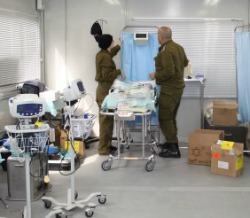
29. When Japan was rocked by an earthquake and tsunami in March 2011, which killed nearly 16,000 people, the IDF sent doctors and other volunteers to set up a field hospital in one of the areas worst hit by the island nation’s worst-ever natural disaster. The facility had wards for pediatrics, surgery, maternity, gynecology, ophthalmology and intensive care, as well as a lab and a pharmacy. Israel also sent over tons of aid to Japanese communities.
Since then, Israel has continued to send regular delegations of specialists on post-trauma missions to help the victims of the disaster, training local teachers and mental health workers, and setting up youth leadership training programs for students from Japan’s Tohoku earthquake-affected region.
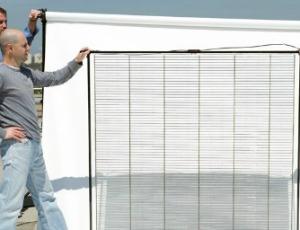
30. The Israeli company Pythagoras Solar has developed a new solar window that can generate power, reduce energy consumption and let in daylight, promising a green revolution in the construction industry.
The world’s first transparent photovoltaic glass unit, which won the prestigious GE Ecomagination Challenge, can easily be integrated into conventional building design. Existing office blocks can be retrofitted with the new material to take the place of energy-seeping glass windows.
31. With pollution growing to dangerous levels in the Mediterranean Sea, Israel’s EcoOcean research and educational organization trains local youngsters on land and sea, and provides local and international marine researchers with an at-cost vessel for advanced marine science studies in the Mediterranean, Red and Black seas.
Jean-Michel Cousteau’s Ocean Futures Society sought out educational collaboration possibilities with EcoOcean to make global progress in saving the seas, badly in distress from global warming and other manmade causes.
32. The Israeli organization Save a Child’s Heart has brought more than 3,000 children from all over the developing world, including about 1,500 from Gaza and the West Bank, to Israel for vital heart operations at Wolfson Medical Center in Holon. All 70 to 80 doctors and nurses working with the non-profit organization give their time as volunteers.
Aside from their work in Israel, medical staff fly on missions abroad to carry out heart operations, and to teach local doctors the latest surgical techniques. The organization also trains physicians from abroad in Israel.
33. US veterans suffering PTSD after being wounded in combat are experiencing emotional and spiritual healing thanks to a new program that brings the wounded vets to Israel to meet Israeli peers.
34. The Israeli organization ZAKA (Disaster Victim Identification) provides expert search-and-rescue assistance after natural and manmade disasters around the world. In late 2004 and early 2005, members of ZAKA provided help in Thailand, Sri Lanka, India and Indonesia in the aftermath of the Indian Ocean earthquake.
Forensic teams dubbed the group “the team that sleeps with the dead” because they toiled nearly 24 hours a day at Buddhist pagodas transformed into morgues in Thailand. ZAKA volunteers flew to Mumbai, India, after terror attacks there in November 2008; assisted with search and recovery after the 2010 Haiti earthquake, rescuing eight students trapped in rubble; and also aided search-and-rescue efforts in Japan in March 2011.
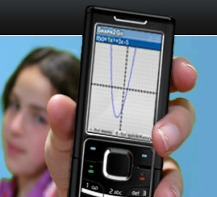
35. Students in several countries are scoring higher marks in math and algebra tests thanks to the help of Israeli professor Michal Yerushalmy. Yerushalmy developed VisualMath and Math4Mobile, which help students score better on standardized tests, out-perform peers in solving algebra word problems and complex new problems, and devise superior strategies for identifying and correcting mistakes.
36. A new Israeli-developed tooth varnish is saving the lives of kangaroos in captivity, who often fall victim to a contagious, and sometimes fatal, gum condition called lumpy jaw disease.
Veterinarians at Jerusalem’s Biblical Zoo and the northern Gan Garoo Park – which lost 40 percent of its marsupials to this disease — teamed up with dentists and pharmacists from the Hebrew University of Jerusalem to create a tooth varnish that successfully prevents the condition. After receiving requests worldwide, the veterinarians published the recipe for the treatment online.
37. An Israeli research team has found a way to mate male prawns and increase yields and profitability for farmers. The revolutionary advanced gene-silencing biotechnology for aquaculture was developed at BGU and can reverse the sex of the crustacean, helping local farmers increase their income. The technology is already being put to use in Vietnam.
38. The 27-year-old Jerusalem AIDS Project (JAIP) is helping to educate millions of people across the globe about AIDS with its training program that teaches people in developing countries how to protect themselves from the deadly HIV virus.
The unique JAIP program is being used in about 30 countries, including Latin America, Asia, Africa and Eastern Europe, in coordination with groups such as the World Health Organization and UNAIDS. JAIP was commended by the United Nations in 2006 for its approach.
39. Israeli doctors are flying to Africa to help train local medical personnel in male medical circumcision with the organization Operation Abraham, in an effort to halt the AIDS epidemic there. Currently some 22 million people in Africa are living with HIV and AIDS – two-thirds of the entire world’s population of HIV sufferers.
Studies suggest that more than half of all HIV infections could be stopped if men were circumcised. Operation Abraham is a consortium of Israeli institutions, including Hadassah Medical Organization and JAIP, teaching local doctors how to carry out the procedure.
40. Israeli aid organizations Israel Flying Aid, IsraAID and Israeli Humanitarian Aid-Latet put Israeli know-how to work getting food, fuel, generators and other critical supplies to emergency workers and victims after Hurricane Sandy devastated the US east coast in 2012.
Israeli volunteers delivered fuel to hospitals in the stricken area, prepared emergency food convoys and helped clear debris. An Israeli delegation of trained rescue volunteers also flew to the disaster area. The effort was financed by young Israelis and Israeli companies with partner US companies.
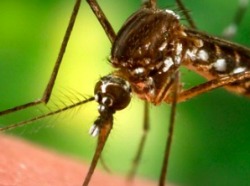
41. A simple mobile-phone imaging system was invented in Israel to diagnose and monitor malaria, a mosquito-borne disease that is the second leading cause of death in Africa, killing an estimated 1,900 children under the age of five every day.
The system uses an ordinary mobile phone camera with a $15 specialized lens that can detect malaria by imaging the eye or skin to look for hemozoin, a pigment generated by the malaria parasite. The imaging system, whose developer won a grant from the Bill & Melinda Gates Foundation, can also determine the stage of the disease. Images can be sent immediately to labs in Africa and overseas for diagnosis by experts.
Read the rest here. Scroll down to the bottom of the page and click on page # 5
About Nicky Blackburn
Editor and Israel Director, Nicky Blackburn has worked extensively as a journalist and editor both in Britain and Israel for a range of national and international publications including
The Cambridge Evening News,
London News,
Travel Weekly,
Israel High Tech Investor, and
The Times of London. She was the Associate Editor at
LINK Israel’s Business and Technology Magazine, and the High-Tech Correspondent for
The Jerusalem Post.